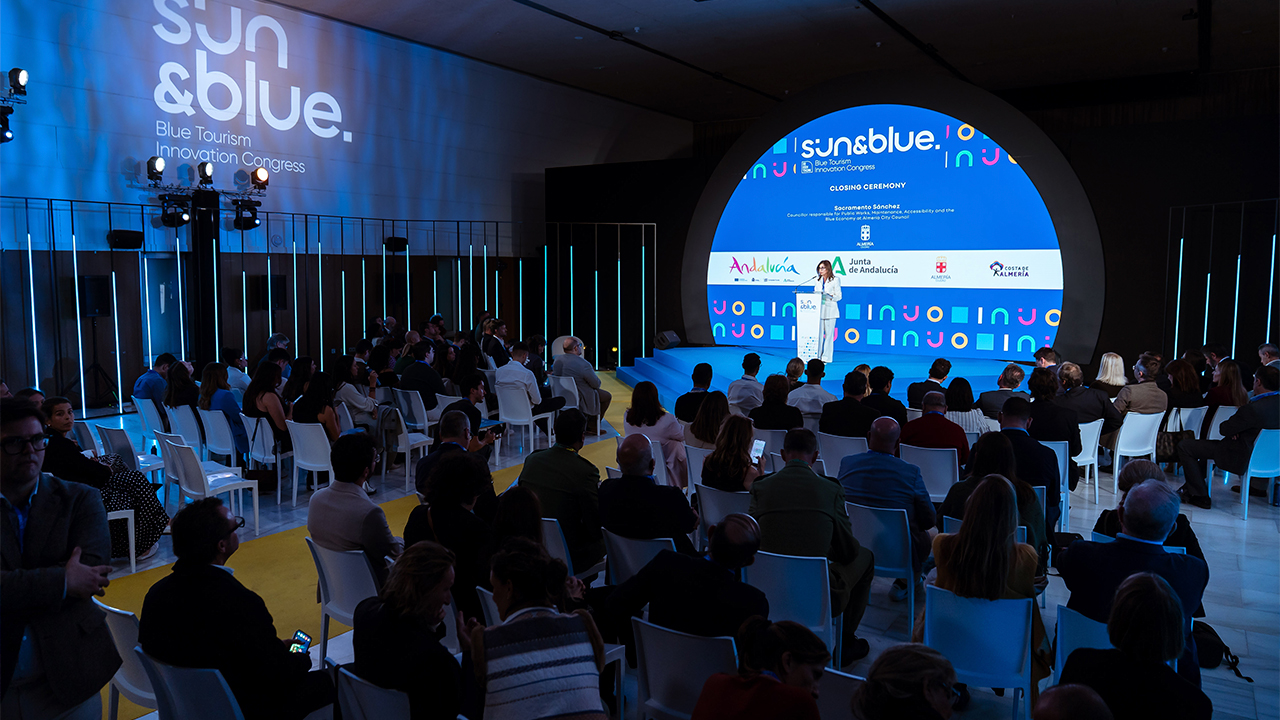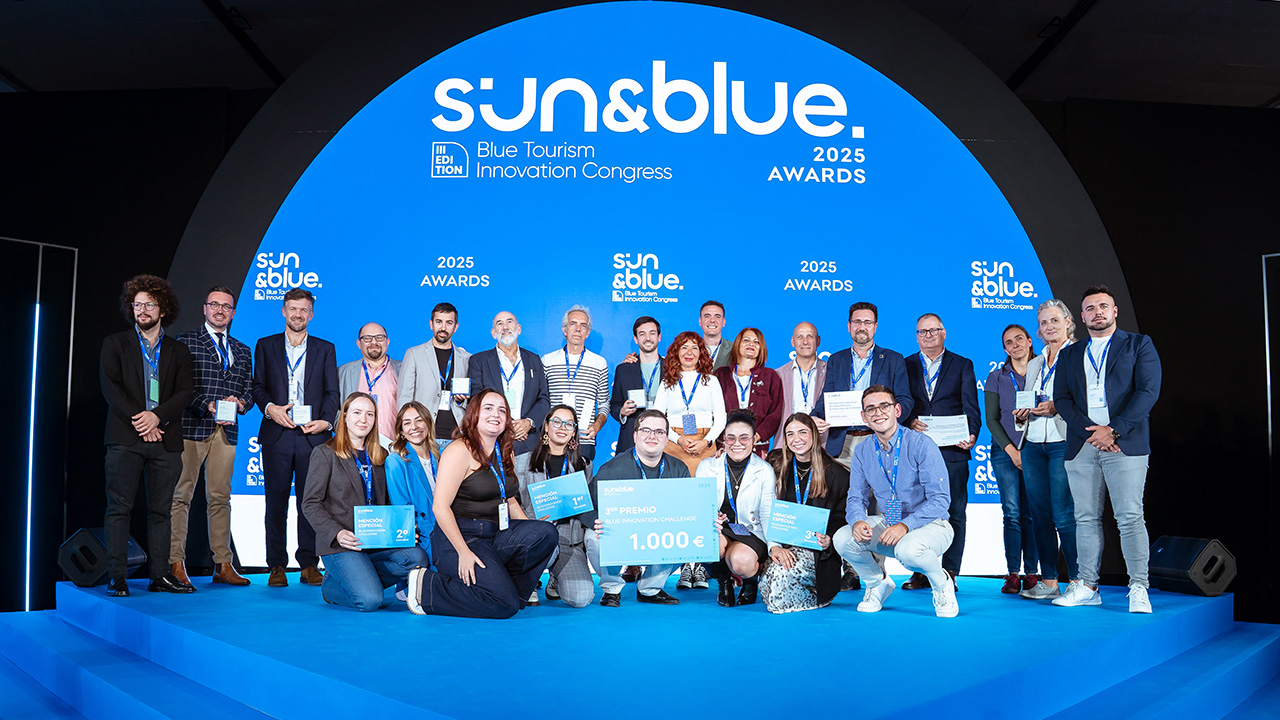Nacho Dean exclusively presents the results of his expedition ‘La España Azul’ at an event organised by Sun&Blue Congress
The naturalist and professional explorer visited the University of Almeria where he met with authorities, businessmen and students. Blue Spain' is the first scientific and informative expedition sailing around Spain. Its mission is to document the state of marine ecosystems, focusing on marine litter and plastic pollution. Cigarette butts are the most common waste found on Spanish beaches and it is suggested that these places be declared ‘smoke-free spaces’. More than ten are the solutions that ‘Blue Spain’ points out to counteract marine pollution.
Published at 1 year ago
Sun&Blue Congress, the first international congress on Tourism and Blue Economy, has organised a satellite event at the University of Almeria, where its ambassador Nacho Dean, naturalist and professional explorer, has exclusively presented the results of his scientific expedition ‘Blue Spain’. The meeting was chaired by Tim Ott, director of Sun&Blue Congress; Sacramento Sánchez, Deputy Mayor of Almería; Miguel Pérez Valls, delegate of the Rector for Strategy, Communication and Coordination of the University of Almería; and Mariola Hidalgo, president of the Social Council of the University of Almería; in addition to the attendance of the General Secretary of the Agricultural and Fisheries Management Agency of Andalusia, Margarita Cobos, and a high representation of authorities, companies and students of the city. This event is part of the ‘Europe Maritime Day’ project of the European Commission's Directorate-General for Maritime Affairs and Fisheries (DG MARE).
Blue Spain', led by Nacho Dean, is the first scientific and informative expedition sailing around Spain with the mission of documenting the state of marine ecosystems with a focus on marine litter and plastic pollution. The voyage lasted 10 months, covered 10 autonomous communities - Basque Country, Cantabria, Asturias, Galicia, Canary Islands, Andalusia, Murcia, Valencia, Balearic Islands and Catalonia - and carried out a total of 23 beach clean-ups, 1 open sea clean-up with jet skis and 2 river clean-ups with boats, mobilising 1,137 volunteers.
‘We removed 1,540.6 kilograms of marine litter and more than 42,800 items of waste from the beaches, 51% of which were identifiable objects, while the remaining 49% were plastic fragments, microplastics, metal and glass. Of the identifiable objects, plastics make up 43%, while paper and cardboard make up 37% and hygienic waste 9%. The remaining 12% are other categories such as metal and wood. Although the paper and cardboard category only represents 21% of all marine litter, the most collected waste of the entire expedition was cigarette butts: 8,274 units. The most collected plastic was caps, plugs and rings. Of the fragments, 81% were plastic fragments, with more than 6,800 meso- and microplastics collected’, explained Nacho Dean as the main results.
These results show, as Dean explained, that the most common sources of marine pollution are those linked to urban activity, as well as a lack of awareness and tourism, combined with the transport of waste from land to the sea via rivers and its subsequent transport by natural processes such as tides. Another conclusion of the expedition is the major problem of smoking on beaches and the urgency of implementing more stringent measures, as well as promoting safe practices and promoting the use of tobacco on beaches.
‘To counteract marine pollution, it is essential to tighten regulations, adopt sustainable practices, encourage sustainable tourism, greater environmental responsibility in the production chain, and support citizen science projects,’ suggests Nacho Dean.
He also highlighted the considerable presence of micro- and meso-plastics (the result of plastic degradation), underlining the urgency of tackling plastic pollution and the environmental threat they pose to marine life and human health.
Microplastics in Blue Spain
During the voyage, an analysis of the distribution of floating microplastics along the Spanish coastline was also carried out through the analysis of 166 samples at 31 locations in the autonomous communities of the Atlantic coast (Basque Country, Cantabria, Asturias, Galicia, Western Andalusia and the Canary Islands) and the Mediterranean (Eastern Andalusia, Murcia, Valencia, Catalonia and the Balearic Islands). ‘88.55% of the samples analysed contained potential plastics, demonstrating the presence of this pollutant along the Spanish coast. Among the types of plastic, fragments predominate, being more present in the Mediterranean Sea, while in the northern Atlantic there is a greater abundance of threads and fishing lines, probably associated with the high fishing activity’, Nacho Dean pointed out.
The solutions provided by Nacho Dean after his expedition ‘Blue Spain’ are: install more collection points and ashtrays; declare beaches ‘smoke-free areas’; control dumping and underwater outfalls; more citizen science; more education and environmental awareness; promote beach clean-ups; take specific measures in each coastal area; reduce the production and use of plastics; regulate products that release microplastics; promote the circular economy; implement sustainable practices; tighten regulations; technological development; and promote tourism and sustainable consumption.
After the presentation of the results of the ‘Blue Spain’ expedition, Nacho Dean held a meeting with students from the University of Almeria in order to tell them about his different expeditions such as ‘Blue Spain’, ‘Nemo’ or ‘Earthwidewalk’ and share with them the lessons learned, the anecdotes experienced, as well as addressing issues such as leadership, self-improvement, resilience and team management.
.jpg)


